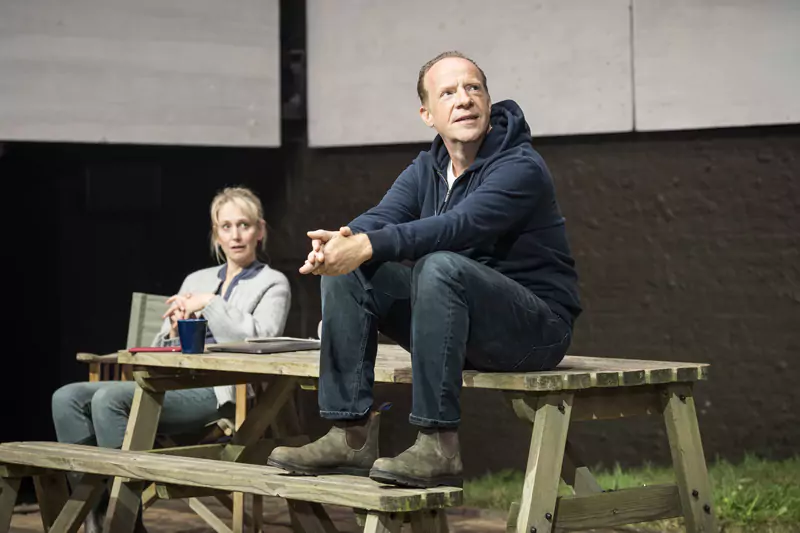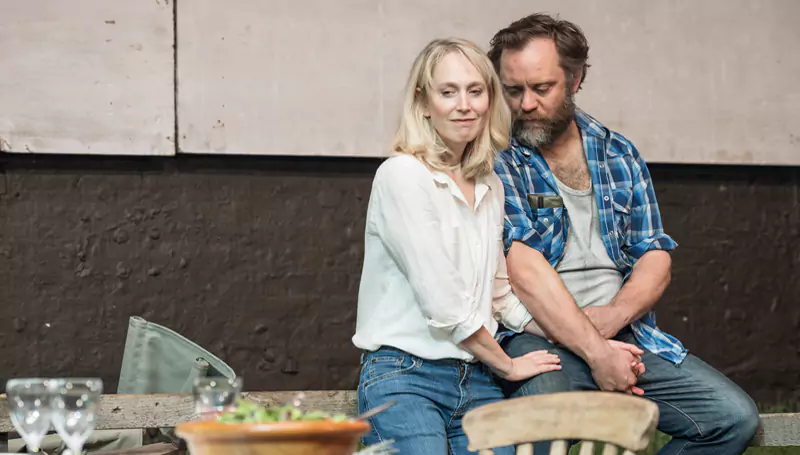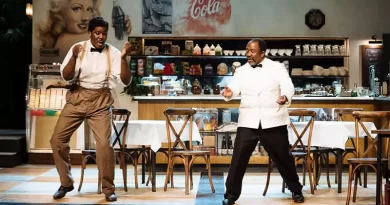“Juniper Blood”, Donmar Warehouse
Neil Dowden in the West End
31 August 2025
★★★
Juniper Blood at the Donmar Warehouse is Mike Bartlett’s second new play in the West End this year, following on from Unicorn at the Garrick (both directed by long-time collaborator James Macdonald). If the latter was a sort of companion piece to Bartlett’s sexual relationship drama Cock, the former is comparable to his state-of-the nation rural drama Albion. But while Juniper Blood is a stronger, more compelling play than the disappointingly lacklustre Unicorn, although it too is commendably ambitious it falls short of the success of Albion – one of the highlights in a prolific and varied career that has often seen Bartlett take on some of the most important issues of the day.

Nadia Parkes and Terique Jarrett.
Photo credit: Marc Brenner.
Both set in Oxfordshire, Albion revolves around restoring the ruined garden of a family country mansion, whereas Juniper Blood is about the future development of a multi-generational inherited farm called Juniper Rise. Like Bartlett’s dystopian epic on the climate crisis Earthquakes in London, it deals with urgent environmental themes, specifically the viability of ethical, organic farming that protects rather than degrades the land.
The scene is set for dramatic discord. After the death of his father, Lip has left London to take over the family farm with his partner Ruth, planning to bring back livestock alongside arable crops and run it as a sustainable concern. They are visited by her former stepdaughter Milly and her friend Femi – who just happens to be doing an MSc in rural ecology at Oxford University! – who, respectively, think they are just virtue-signalling and not going far enough. Neighbouring farmer Tony – who is making a good profit from his own intensively farmed land using inorganic fertilizer and pesticides – also thinks they are woke fools doomed to failure.
But each character revises their outlook as events unfold. Lip loses faith in their project and wants to return the land to nature – rewilding – growing just enough food for them to live on and abandoning the use of modern technology. But this is too much for Ruth, who is pregnant with their daughter and will not do without all that medical science can offer. Milly becomes an eco-convert, while Femi moderates his former ideological views. And the lonely Tony – whose wife has died of cancer – makes a play for Ruth whom he thinks Lip has neglected.

Hattie Morahan and Jonathan Slinger.
Photo credit: Marc Brenner.
The trouble is that much of the conflict that develops does not seem very, er, organic. Although the people involved do change it sometimes feels less of an evolution and more that they are being used as part of a wordy debate on sustainable farming – with Femi in particular underwritten as a character and given to long academic monologues in what is a rather didactic if intelligent play that asks serious questions about how we should live in a world we are destroying.
Bartlett does set up interesting dichotomies between idealism and pragmatism, and between prioritizing responsibilities to family and the planet. Are Lip and Ruth rejecting corporate capitalism in a positive way, or just running away from reality into a delusional utopia? And there are moments of real theatrical impact such as Lip tipping soil onto the picnic table to reveal how little insect life is now left in it, or smashing his mobile phone to smithereens. But too often Juniper Blood packs in meaty ideas without dramatically digesting them.
The play is carefully structured. Each of the three acts – divided by time and separated by short intervals – starts with several minutes of dialogue-free action. First, Lip sitting alone while humming a tune and rolling a joint before Milly piggybacking on Femi after swimming noisily gatecrash his reverie. Then, Ruth sipping a glass of rosé wine while (significantly) messaging on her phone until Tony arrives to crudely flirt. And, finally, Lip chopping firewood and now singing the folk song “’Twas on One April Morning”, joined by the happily labouring Milly, but then later by the other three who bring them back down to earth (as it were). The outside world cannot be ignored.
Macdonald’s characteristically detailed, nuanced production holds our attention throughout. Ultz’s convincing design features a grassy, earthy mound topped by decking with wooden furniture, which by the last act has disintegrated as wild nature takes over the farm again and what look like small juniper shrubs fall on stage from the flies. Jo Joelson’s bright (sunny?) lighting dims at the end of each act, while Helen Skiera’s delicate soundscape includes background birdsong interrupted by the occasional aeroplane.
The cast is strong. Sam Troughton ambivalently portrays Lip as a middle-aged man either having an epiphany or a breakdown, with the intense air of a monomaniac staring into the distance and a disconcerting bottled-up taciturnity alternating with gushes of impassioned speech. Hattie Morahan makes a more moderate, sympathetic Ruth looking for a more natural lifestyle without really knowing how to achieve it. Intergenerational conflict is provided by Nadia Parkes’s fierily confrontational Milly who is evidently damaged by past relationships and Terique Jarrett’s amiably disputatious Femi who takes a more intellectual approach. And as the bluntly bantering Tony, Jonathan Slinger makes the most of having the play’s funniest lines while also suggesting a struggle to move on from grief, as he bemoans the decline of old England when “We just lived, and the future was…good.”









